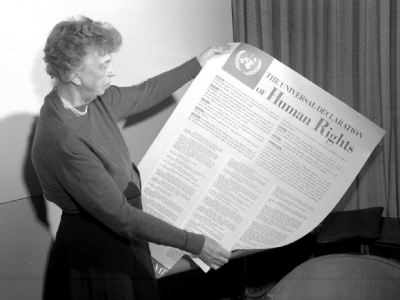How much progress have we made over the past 70 years in securing human rights?

E.W. Deming famously said, “What gets measured gets managed.” This is an important reminder to all of us as to why goal-setting is such an important part of corporate citizenship work.
This month marks the 70th anniversary of the Universal Declaration of Human Rights, the landmark international agreement adopted by the UN General Assembly, which—for the first time—outlined the basic human rights of people across the globe. This document was drafted by diverse stakeholders from all regions of the world, led by a committee that was headed by Eleanor Roosevelt (pictured at right, holding the document in 1948).
The Declaration has been the common standard of achievement for all people and nations, based on the dignity, equality, and fairness for individuals. It contained 30 articles that set out member state obligations, as well as the freedoms to which everyone is entitled: the rights to life, work, freedom from discrimination and slavery, and other core tenets which are the accepted standard for governmental action. Many of these articles still map to the Human Rights Watch’s State of Global Human Rights 2018; and in just the past year, regulation in Canada, France, India, California and other economies across the world have supported protecting human rights, both in a broad sense and on specific issues like human trafficking.
So… what have we achieved since the Declaration? Quite a lot. Even since just the Millennium Development Goals were established, more than one billion people have been lifted out of extreme poverty, we have made inroads against hunger, more girls are attending school than ever before, maternal and infant deaths were reduced by more than 50 percent, and climate awareness is higher than it has ever been.i
The basic rights laid out by the Declaration also endure in corporate citizenship, as businesses have become major players in protecting and advocating for human rights. The corporate operations—whether large or small—can impact people with whom they have a variety of relationships (employees, shareholders, suppliers, and communities). Many firms like Nestlé Purina PetCare Company have integrated human rights into corporate business principles, including responsible sourcing guidelines to prevent violations of human rights and set expectations with suppliers on a global scale.
Today, the Declaration is more relevant than ever as business, governments, nonprofits, and individual stakeholders come together to tackle the world’s most pressing challenges. The Sustainable Development Goals (SDGs) and the Paris Climate Accord are just two examples of how the Declaration’s legacy continues to bring together people with a common purpose to protect today the rights of stakeholders that affect our ability to achieve a sustainable future.
From the Universal Declaration of Human Rights in 1948 to the UN Sustainable Development Goals of today, it has always been the case that when people unite to advance ambitious goals, the goals become possible to achieve.
As corporate citizenship professionals, we carry on the legacy of the Universal Declaration of Human Rights and its progeny, the Sustainable Development Goals. I hope that you take inspiration from the progress that has been made thus far and use this momentum to engage your own people—employees, colleagues, community leaders, and so many other key stakeholders—around the purposeful work of creating a more just and sustainable future for us all. As the late, great Hans Rosling was fond of saying: With continued investment and effort, we can all reach health and sustenance.
[i] World Vision International. (2015). Were the Millennium Development Goals a success? Yes! Sort of. [online] Available at: https://www.wvi.org/united-nations-and-global-engagement/article/were-mdgs-success.
